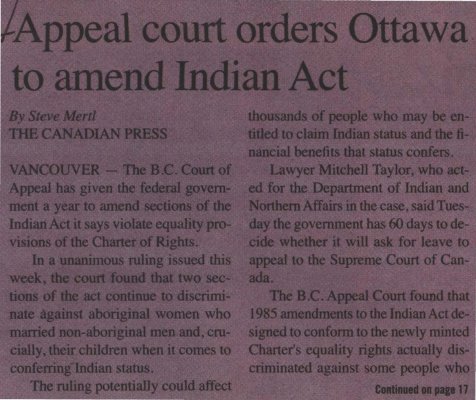"Appeal court orders Ottawa to amend Indian Act"
- Publication
- Tekawennake News (Ohsweken, Ontario), 8 Apr 2009, pp.1, 17
- Full Text
- Appeal court orders Ottawa to amend Indian ActBy Steve Mertl, THE CANADIAN PRESS
VANCOUVER - The B.C. Court of Appeal has given the federal government a year to amend sections of the Indian Act it says violate equality provisions of the Charter of Rights.In a unanimous ruling issued this week, the court found that two sections of the act continue to discriminate against aboriginal women who married non-aboriginal men and, crucially, their children when it comes to conferring Indian status.
The ruling potentially could affect thousands of people who may be entitled to claim Indian status and the financial benefits that status confers.
Lawyer Mitchell Taylor, who acted for the Department of Indian and Northern Affairs in the case, said Tuesday the government has 60 days to decide whether it will ask for leave to appeal to the Supreme Court of Canada.
The B.C. Appeal Court found that 1985 amendments to the Indian Act designed to conform to the newly minted Charter's equality rights actually discriminated against some people who
Continued on page 17
Continued from Frontshould be able to claim Indian status.
The legislative reforms were supposed to end sex discrimination under Section 15 of the Charter but the complications of maternal and paternal lineage, inside and outside marriage, made it a difficult job.
The court found that compromises reached in the amended Indian Act to protect those with Indian status and others who'd regained it ended up creating further discrimination.
The ruling stems from a longstanding dispute involving Sharon McIvor of Merritt, B.C., and her son Charles Grismer.
McIvor lost her Indian status when she married a non-aboriginal man. After the Indian Act was amended in 1985, she applied for reinstatement for herself and her son, a process that ended up taking 20 years.
Indian status opens the door to a range of entitlements, including extended health benefits, money for education and exemption from some taxes. The court also found there are intangible benefits, including acceptance in the aboriginal community.
McIvor and Grismer challenged a provision that barred Grismer from passing on Indian status to children that he had with his non-aboriginal spouse.
Before 1985, if two generations of status Indian men married non-Indian women, the next generation lost its Indian status at age 21.
With the 1985 reforms, that generation's Indian status was reinstated for life but McIvor and her son were not covered because she was a woman.
"While the legislative schemes are complex, the complaint is essentially that Mr. Grismer's children would have Indian status if his Indian status had been transmitted to him through his father rather than through his mother," Justice Harvey Groberman writes in the judgement.
Although it puts the on notice, the Appeal Court ruling struck down the more expansive elements of the original B.C. Supreme Court decision that spurred the government's appeal.
The lower court ruling gave the government no time to implement changes before the law's unconstitutional sections were voided.
It also would have granted Indian status to anyone who could show that somewhere in their family background a woman lost Indian status by marrying a non-Indian.
The Appeal Court imposed the one-year timetable to amend the law and narrowed the lower court's multi-generational scope.
It's not clear how many people could be affected, said Taylor.
"It's something that is still being looked at. (It) could be- several thousand but can't be more specific than that at this point," he said.
The NDP's aboriginal affairs critic urged the government to drop any thought of appealing to the Supreme Court and move quickly to eliminate the Charter violations in the law.
"Given that the judges said that, I would say that it's incumbent upon the government to act," said Jean Crowder, MP for Nanaimo-Cowichan on Vancouver Island.
Crowder was also concerned the case did not address the so-called second-generation cutoff contained in the act. It means children of mixed Indian and non-Indian parentage do not have status. It's a ticking time bomb for survival of First Nations, she said.
"That's the one where unless you continue to marry status, if you marry out and your children marry out, their children won't have status," said Crowder. "You end up with assimilation by the back door."
- Media Type
- Text
- Newspaper
- Item Type
- Clippings
- Description
- "The B.C. Court of Appeal has given the federal government a year to amend sections of the Indian Act it says violate equality provisions of the Charter of Rights."
- Publisher
- Tekawennake News
- Place of Publication
- Six Nations of the Grand River, ON
- Date of Publication
- 8 Apr 2009
- Date Of Event
- 7 Apr 2009
- Subject(s)
- Personal Name(s)
- Taylor, Mitchell ; McIvor, Sharon ; Grimser, Charles ; Groberman, Justice Harvey.
- Corporate Name(s)
- Indian and Northern Affairs Canada ; Supreme Court of Canada ; British Columbia Court of Appeal.
- Local identifier
- SNPL004580v00d
- Language of Item
- English
- Geographic Coverage
-
-
British Columbia, Canada
Latitude: 49.24966 Longitude: -123.11934
-
- Creative Commons licence
 [more details]
[more details]- Copyright Statement
- Public domain: Copyright has expired according to Canadian law. No restrictions on use.
- Copyright Date
- 2009
- Copyright Holder
- Tekawennake News
- Contact
- Six Nations Public LibraryEmail:info@snpl.ca
Website:
Agency street/mail address:1679 Chiefswood Rd
PO Box 149
Ohsweken, ON N0A 1M0
519-445-2954



